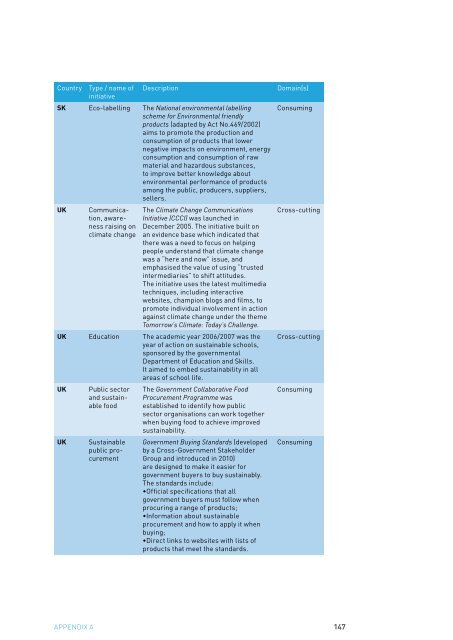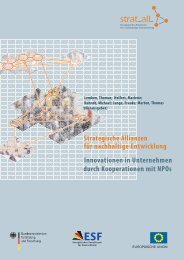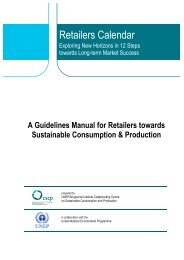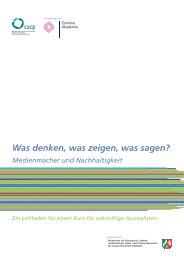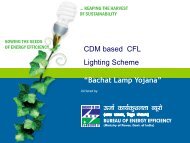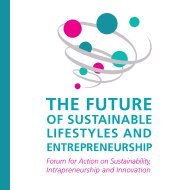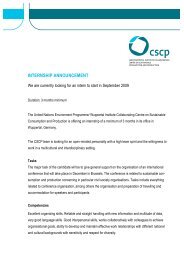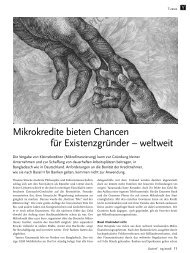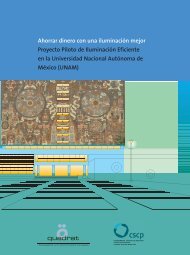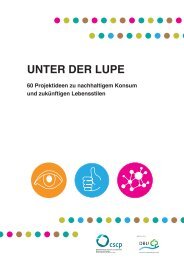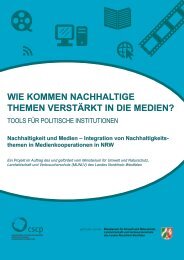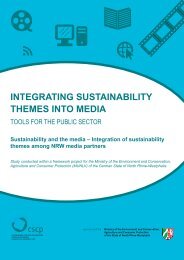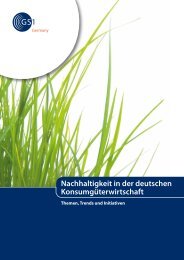today's facts & tomorrow's trends - SPREAD Sustainable Lifestyles ...
today's facts & tomorrow's trends - SPREAD Sustainable Lifestyles ...
today's facts & tomorrow's trends - SPREAD Sustainable Lifestyles ...
Create successful ePaper yourself
Turn your PDF publications into a flip-book with our unique Google optimized e-Paper software.
Country Type / name of<br />
initiative<br />
Description<br />
SK Eco-labelling The National environmental labelling<br />
scheme for Environmental friendly<br />
products (adapted by Act No.469/2002)<br />
aims to promote the production and<br />
consumption of products that lower<br />
negative impacts on environment, energy<br />
consumption and consumption of raw<br />
material and hazardous substances,<br />
to improve better knowledge about<br />
environmental performance of products<br />
among the public, producers, suppliers,<br />
sellers.<br />
UK<br />
Communication,<br />
awareness<br />
raising on<br />
climate change<br />
The Climate Change Communications<br />
Initiative (CCCI) was launched in<br />
December 2005. The initiative built on<br />
an evidence base which indicated that<br />
there was a need to focus on helping<br />
people understand that climate change<br />
was a “here and now” issue, and<br />
emphasised the value of using “trusted<br />
intermediaries” to shift attitudes.<br />
The initiative uses the latest multimedia<br />
techniques, including interactive<br />
websites, champion blogs and films, to<br />
promote individual involvement in action<br />
against climate change under the theme<br />
Tomorrow’s Climate: Today’s Challenge.<br />
UK Education The academic year 2006/2007 was the<br />
year of action on sustainable schools,<br />
sponsored by the governmental<br />
Department of Education and Skills.<br />
It aimed to embed sustainability in all<br />
areas of school life.<br />
UK<br />
UK<br />
Public sector<br />
and sustainable<br />
food<br />
<strong>Sustainable</strong><br />
public procurement<br />
The Government Collaborative Food<br />
Procurement Programme was<br />
established to identify how public<br />
sector organisations can work together<br />
when buying food to achieve improved<br />
sustainability.<br />
Government Buying Standards (developed<br />
by a Cross-Government Stakeholder<br />
Group and introduced in 2010)<br />
are designed to make it easier for<br />
government buyers to buy sustainably.<br />
The standards include:<br />
•Official specifications that all<br />
government buyers must follow when<br />
procuring a range of products;<br />
•Information about sustainable<br />
procurement and how to apply it when<br />
buying;<br />
•Direct links to websites with lists of<br />
products that meet the standards.<br />
Domain(s)<br />
Consuming<br />
Cross-cutting<br />
Cross-cutting<br />
Consuming<br />
Consuming<br />
Appendix A 147


